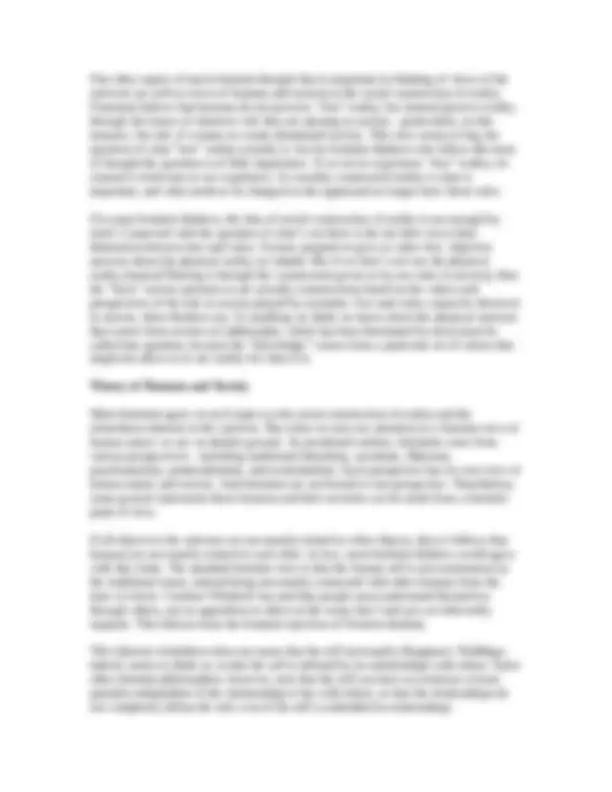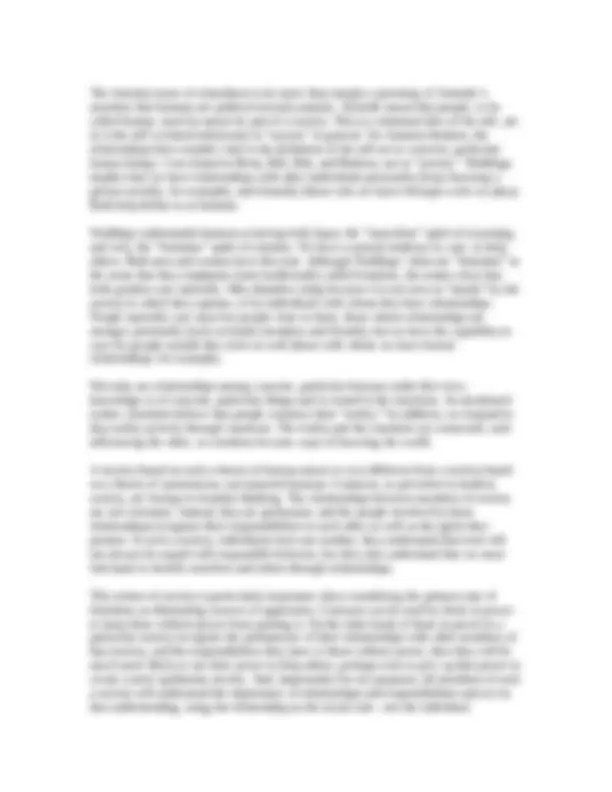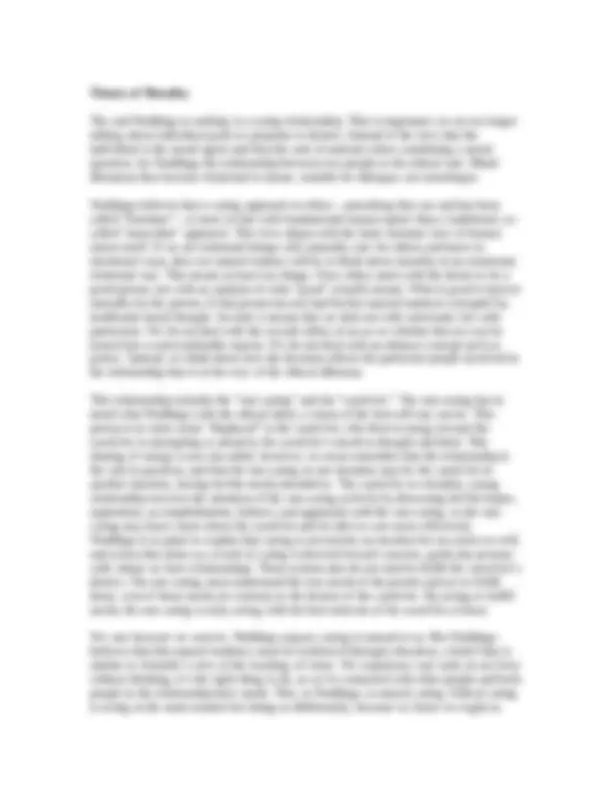





Study with the several resources on Docsity

Earn points by helping other students or get them with a premium plan


Prepare for your exams
Study with the several resources on Docsity

Earn points to download
Earn points by helping other students or get them with a premium plan
Community
Ask the community for help and clear up your study doubts
Discover the best universities in your country according to Docsity users
Free resources
Download our free guides on studying techniques, anxiety management strategies, and thesis advice from Docsity tutors
Noddings- Care Ethics Material Type: Notes; Professor: Roy; Class: WORLD WISDOM TRADITIONS; Subject: Philosophy; University: Ramapo College of New Jersey; Term: Fall 2010;
Typology: Study notes
1 / 7

This page cannot be seen from the preview
Don't miss anything!




Noddings and Caring Caring—defined as a desire to help others fulfill their legitimate desires and improve their current states of affairs as well as acting on that desire—has been an element of the conversation about morality for a long time. However, in the past 25 years or so a new emphasis has been placed on what is called the “ethic of care,” resulting primarily from the work of feminist thinkers. People such as Carol Gilligan and Annette Baier have argued that women think about morality and moral decisions in different ways from men. They note that while men tend to think about universal principles, rights, and justice in forming their views of morality, women tend to think about context, responsibilities, and concern for others. Because of this, they say, the traditional forms of ethics do not speak to women, because they use different voices to articulate themselves. Others have examined and defined what an ethic of care would look like. One of the most prominent proponents of a caring ethic is Nel Noddings. Her two books, Caring and Women and Evil , develop what has been called a “relational ethics” (Tong, p. 114) based on caring. We will examine Noddings’ ideas specifically in the section on the theory of morality. It must be understood, however, that Noddings is working from a basis that is common to feminine and feminist approaches to morality, and this basis has been articulated clearly in other authors’ work, so reference to them will be made throughout the chapter. It must also be noted that there are many types of feminist philosophy, including postmodern feminism, liberal feminism, Marxist feminism, and existentialist feminism (among others)—not all of which agree with any other type on some of the questions we are addressing. So when the text says, “feminists think,” or “feminism is based on,” or some such phrase, we must understand that not all feminist thinkers will agree with the statement. But all statements made in this chapter fit well into Noddings’ theory of a caring morality. Feminism itself is a primarily social/political/moral movement, aimed at removing the sources of oppression of women in modern society. So to the extent that this discussion fits the general format, it is attempting to fit a not obviously square peg into a square hole. In fact, the peg may be round. So it is important to remember, particularly when considering the theory of the universe, that some concepts may be used in ways other than those intended by various authors. They are at most tentative explorations of what a feminist theory of the universe might look like. Life Noddings was born Nel Rieth in 1929 in Irvington, New Jersey. She graduated from Montclair State Teachers College, now Montclair State University, with a degree in mathematics in 1949, the same year she married James A. Noddings. After college Noddings taught in junior high and high school in New Jersey until 1969, along the way rearing 10 children as well as earning a master’s degree in mathematics from Rutgers University in 1964. Later in her secondary teaching career she went into administration, becoming an assistant principal and then a curriculum supervisor.
Graduating from Stanford University with a Ph.D in education in 1973, Noddings taught education at Pennsylvania State University, became the University of Chicago’s director of precollegiate education, and then moved back to Stanford in 1977. She worked her way through Stanford’s School of Education, eventually becoming director of teacher education, associate dean and acting dean. Noddings was named Lee L. Jacks Professor of Child Education in 1992. Noddings’ major book was Caring: A Feminine Approach to Ethics and Moral Education , published in 1984. Her work in feminine approaches to morality and education has continued with the books Women and Evil (published in 1989) and The Challenge to Care in Schools: An Alternative Approach to Education (published in 1992). Her stated goal is to explore what she calls “the central interests of human (mainly feminine) experience: love, morality, caring, nurturance, family life, virtue, and peace” ( Contemporary Authors , New Revision, 48, p. 355). Theory of the Universe The differences between feminist and traditional thinkers regarding morality start with the fundamental assumptions made concerning the nature of the universe. Most traditional Western thinkers see the world in a dualistic manner. For example, Aristotle sees the world as containing form and matter; Kant sees a noumenal and phenomenal world; even Nietzsche, for all his revolutionary tendencies, views the universe in terms of being and becoming. Western thinkers have set up polar opposites to describe the world. In contrast, feminist thinkers tend to emphasize the relatedness of the world. Objects are not distinct from each other, forming discrete categories. Instead objects are necessarily connected to each other. It is not that objects “outside” us do or do not exist —a point argued over the centuries in Western philosophy. For feminists, objects really only exist in relationship to other objects. For example, Descartes’ classic statement on whether he exists, “I think, therefore I am,” is criticized as being counterintuitive. Lorraine Code, a noted feminist thinker, says that before the “I” can think, or even exist, it must first be a “you”—related to something else and understandable only in that context. Feminists have found it difficult to decide how to model the relationships inherent in the universe. Some argue that the mother-child relationship is best; others will opt for a model of friendship. The distinctions between these types of relationships are important in many ways, but for our present purposes it is enough to say that both emphasize personal relationships, and particuarly relationships where people (or objects) regard one another highly and hope for the best for the other. Noddings, in fact, might define objects solely by their relationships to other objects. In essence, she says, objects cannot exist without relationships to other objects. This would seem to imply a physical universe, for the objects would seem to have to be real to be related, but this is not something often discussed by feminist philosophers, because they are more interested in social, political, and moral implications of their views.
The feminist sense of relatedness is far more than simply a parroting of Aristotle’s assertion that humans are political (social) animals. Aristotle meant that people, to be called human, must by nature be part of a society. This is a relational idea of the self, yet in it the self is related nebulously to “society” in general. For feminist thinkers, the relationships they consider vital to the definition of the self are to concrete, particular human beings. I am related to Betty, Bill, Bob, and Barbara, not to “society.” Noddings implies that we have relationships with other individuals personally (from knowing a person socially, for example), and formally (those who we know through a role we play). Both help define us as humans. Noddings understands humans as having both logos , the “masculine” spirit of reasoning, and eros , the “feminine” spirit of emotion. We have a natural tendency to care, to help others. Both men and women have this trait. Although Noddings’ ideas are “feminine” in the sense that they emphasize traits traditionally called feminine, she makes clear that both genders care naturally. Men abandon caring because it is not seen as “manly” by the society in which they operate, or by individuals with whom they have relationships. People naturally care most for people close to them, those whose relationships are stronger personally (such as family members and friends), but we have the capability to care for people outside this circle as well (those with whom we have formal relationships, for example). Not only are relationships among concrete, particular humans under this view; knowledge is of concrete, particular things and is rooted in the emotions. As mentioned earlier, feminists believe that people construct their “reality.” In addition, we respond to that reality actively through emotions. The reality and the emotions are connected, each influencing the other, so emotions become ways of knowing the world. A society based on such a theory of human nature is very different from a society based on a theory of autonomous, unconnected humans. Contracts, so prevalent in modern society, are foreign to feminist thinking. The relationships between members of society are not voluntary. Instead, they are permanent, and the people involved in those relationships recognize their responsibilities to each other as well as the rights they possess. In such a society, individuals trust one another; they understand that trust will not always be repaid with responsible behavior, but they also understand that we must risk harm to benefit ourselves and others through relationships. This notion of society is particularly important when considering the primary aim of feminism as eliminating sources of oppression. Contracts can be used by those in power to keep those without power from gaining it. On the other hand, if those in power in a particular society recognize the permanence of their relationships with other members of that society, and the responsibilities they have to those without power, then they will be much more likely to use their power to help others, perhaps even to give up that power to create a more egalitarian society. And, importantly for our purposes, all members of such a society will understand the importance of relationships and responsibilities and act on that understanding, using the relationship as the moral unit—not the individual.
Theory of Morality The end Noddings is seeking is a caring relationship. This is important; we are no longer talking about individual goals or purposes or desires. Instead of the view that the individual is the moral agent and thus the unit of analysis when considering a moral question, for Noddings the relationship between two people is the ethical unit. Moral dilemmas thus become relational in nature, suitable for dialogue, not monologue. Noddings believes that a caring approach to ethics—something that can and has been called “feminine”—is more in line with fundamental human nature than a traditional, so- called “masculine” approach. This view aligns with the basic feminist view of human nature itself. If we are relational beings who naturally care for others and know in emotional ways, then our natural instinct will be to think about morality in an emotional, relational way. This means at least two things. First, ethics starts with the desire to be a good person, not with an analysis of what “good” actually means. What is good is known naturally by the person, if that person has not had his/her natural instincts corrupted by traditional moral thought. Second, it means that we deal not with universals, but with particulars. We do not deal with the overall utility of an act or whether that act can be turned into a universalizable maxim. We do not deal with an abstract concept such as justice. Instead, we think about how the decision affects the particular people involved in the relationship that is at the crux of the ethical dilemma. This relationship includes the “one-caring” and the “cared-for.” The one-caring has in mind what Noddings calls the ethical ideal, a vision of the best self one can be. This person is in some sense “displaced” in the cared-for; s/he directs energy toward the cared-for in attempting to attend to the cared-for’s needs in thought and deed. This sharing of energy is not one-sided, however; we must remember that the relationship is the unit in question, and that the one-caring in one situation may be the cared-for in another situation, having her/his needs attended to. The cared-for in a healthy, caring relationship receives the attention of the one-caring actively by discussing her/his hopes, aspirations, accomplishments, failures, and appraisals with the one-caring, so the one- caring may know more about the cared-for and be able to care more effectively. Noddings is at pains to explain that caring is not merely an emotion but an action as well, and action that arises as a result of caring is directed toward concrete, particular persons with whom we have relationships. Those actions also do not merely fulfill the cared-for’s desires. The one-caring must understand the true needs of the person and act to fulfill those, even if those needs are contrary to the desires of the cared-for. By acting to fulfill needs, the one-caring is truly acting with the best interests of the cared-for at heart. We care because we want to, Noddings argues; caring is natural to us. But Noddings believes that this natural tendency must be reinforced through education, a belief that is similar to Aristotle’s view of the teaching of virtue. We experience care early in our lives without thinking; it’s the right thing to do, as we’re connected with other people and both people in the relationship have needs. This, to Noddings, is natural caring. Ethical caring is acting in the same manner but doing so deliberately, because we know we ought to.
relationships with teachers. These teachers must embody caring in their relationships with their students, both in and out of the classroom, thereby modeling what caring is all about. Such actions by teachers allow their students to be engaged in a caring relationship and learn what it means to be the one-caring and the cared-for. This includes dialogue between teacher and student. In an ethic based on relationships, all moral decisions necessarily affect more than one person, so a dialogue must ensue between the people involved in the relationship to assure that the relationship as a unit is enhanced (or at least not harmed) by the action taken. In a truly caring relationship, those involved will be able to come to agreement on what is best for the cared-for and thus agree on the course of action to be taken. This type of thinking is morally correct in formal relationships as well as in personal relationships. For example, Noddings dislikes the dualistic, us-versus-them thinking that divides rich and poor. Instead, both need to work together to lessen the gap between them. This is an example of Noddings’ belief that ethics is ultimately about overcoming evil through enhancing the connections that are naturally there but are de-emphasized by modern, individualistic, masculine world views. We only overcome evil through embracing relationships, and through addressing the needs of the cared-fors in our lives —not as a group but individually. Noddings’ prescription has been judged as too harsh by some, because it seems to indicate that the one-caring must submerge her/himself in the relationship so much that any sense of self is lost. But it seems more appropriate to say that Noddings is really linking the good of the relationship to the good of the one-caring as well as the good of the cared-for. And as has been stated, the relationship should not be one-way. It also seems appropriate to agree with Noddings when she claims that this ethic is not a slip into moral relativism. Instead, the call to care is universal and natural within both women and men. The ways that caring plays itself out may be very different in different situations for different people involved in different relationships. But the impulse to care is within each of us.